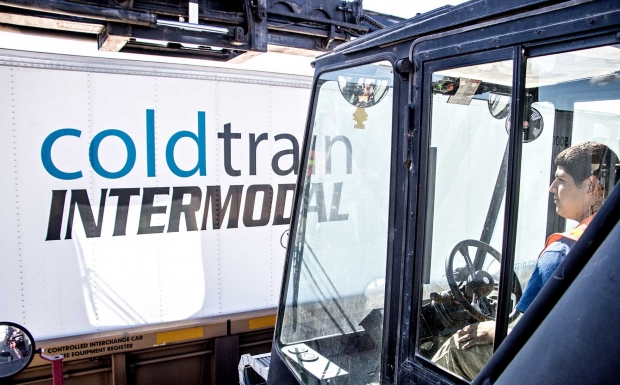
Fernando Ruiz loads a refrigerated container operated by Cold Train Express Intermodal Service onto a rail car on the mile-long BNSF Z-line at the Port of Quincy, Washington on Sept. 18, 2013. (TJ Mullinax/Good Fruit Grower file photo)
Two former officers of Cold Train Express Intermodal Service have filed a $41 million lawsuit against Burlington Northern Santa Fe (BNSF) Railway, alleging they suffered damage after having to shut down the service in August of 2014.
Steven Lawson, the former President/CEO, and Mike Lerner, the former managing member of Cold Train, filed suit in the U.S. District Court in Spokane, Washington.
The shutdown, they say, was caused by a slowdown in BNSF’s service on its Northern Corridor line beginning in the fall of 2013 because of increased rail congestion as a result of BNSF hauling larger volumes of oil and coal from the Northern Plains region.
BNSF’s on-time percentage dropped from over 90 percent to less than 5 percent from November 2013 to April 2014, they say, and then BNSF announced it would reduce service from Washington from two trains a day to one and increase transit time from three days to six.
The delays in service and low on-time percentage ultimately caused Cold Train to lose most of its business as its customers refused to tolerate the delays, Lerner and Lawson say in a press release April 7.
Because of BNSF’s scheduling issues, Cold Train lost most of its fresh produce business, including apples, onions, pears, potatoes, carrots and cherries, which was more than 70 percent of the company’s business, they say.
Lawson and Lerner began working with BNSF in 2009 to start the refrigerated intermodal shipping service. The central idea was to ship fresh produce from central Washington State to retailers in the Midwest. The success of this business, they say, hinged on consistent expedited rail service between the Cold Train’s intermodal terminal in Quincy, Washington (leased from the Port of Quincy), and the BNSF’s intermodal ramp in Chicago, Illinois.
The service grew rapidly. In 2011, Cold Train shipped about 300 containers a month, rising to 500 per month in 2012 and to nearly 700 per month in 2013.
Cold Train continued to purchase and lease containers, and by September 2013, it had more than 400 refrigerated shipping containers in service.
In August 2013, Lawson and Lerner began looking for a capital partner to obrtain funds to continue the expansion.
Even as BNSF’s service was eroding, the railroad assured Cold Train that the on-time issues would be addressed and that service would be restored to previous levels, Lawson and Lerner say. Based on these assurances, Cold Train continued to invest additional money into its business and to seek a financial partner.
In January 2014, they struck a deal with Federated Railways, Inc. to sell Cold Train for about $32 million, they say.
Despite the growing service failure, BNSF asked Cold Train and the Port of Quincy to enlarge the Port of Quincy Intermodal Terminal to accommodate larger trains. But at the same time, it informed Cold Train that it was cancelling the 72-hour service and substituting a new 125-hour service.
As a result of the service change, Federated withdrew its offer to purchase Cold Train.
The lawsuit filed by Lerner and Lawson say that BNSF caused significant damage to them in an amount over $40 million, as well as removing a rail service Washington fruit growers were finding increasingly useful.






Leave A Comment